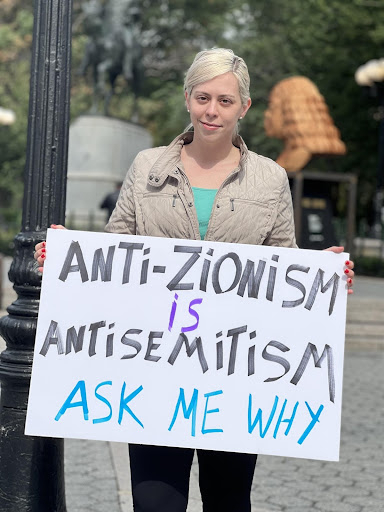
There are few issues more hostile and controversial than the Israeli-Palestinian conflict, especially when it comes to the digital world. As social media has transformed the way we operate online, we've seen a manifestation of real world political conflicts being played out on social media as well – whether that be India and Pakistan, Armenia and Azerbaijan, the US, and Iran, or Israel and Palestine. As a result, there has also been a significant rise in hate speech against minority groups and increased political polarization. Emily Schrader, an Israeli content creator and the CEO of digital marketing firm Social Lite Creative, is hoping to fight that.
Schrader has been one of the leading voices in the fight for more accurate information across social media in the last decade – whether through advising on policy change to fight antisemitism or in being a voice for what she calls "fighting misinformation."
Schrader's background comes from facing off against antisemitism on US campuses. As a politically involved student at University of Southern California, she encountered the campus group Students for Justice in Palestine which held the controversial "apartheid week" events to criticize Israel. Schrader said she was unable to understand why "these American students were so obsessed with Jews," and that many of the inaccurate statements they make about Israel are later repeated in the press as well. Thus began Schrader's journey of correcting exaggerated claims about Israel on a professional, and personal level.
Schrader became an activist on campus, working with organizations like CAMERA on Campus and StandWithUs, before eventually studying in Israel for her Masters's degree at Tel Aviv University. With a background in digital political campaigning, she established the digital department at StandWithUs, growing it to one of the leading pro-Israel platforms in the world today with over a million followers, including in Arabic. "I saw an opportunity to reach a wider audience and knew that there was a lack of information in the Arab world about Israel. I worked to build a team that could remedy that and helps stop lies that fuel incitement to violence," she said.
In 2019, several years after moving to Israel permanently, Schrader left her role to establish her own digital marketing company Social Lite Creative, along with her business partner, Zina Rakhamilova, helping nonprofits, campaigns, and public figures advance social issues in the digital sphere. Through her company and her own content creation, she's led initiatives reaching tens of millions of people through social media in the battle against extremism online, focusing primarily on combating antisemitism and misogyny. "I saw that there are two forms of hate which are the most prevalent online: antisemitism and misogyny. I knew I had to do more to fight it," said Schrader.
In 2020, Schrader was one of the leading voices for the adoption of the International Holocaust Remembrance Association (IHRA) definition of antisemitism on social media platforms, a definition which outlines modern forms of antisemitism such as anti-Zionism, as well as classic forms of antisemitism. Schrader led the #AdoptIHRA social media campaign in which over 125 organizations signed a joint letter to Facebook calling on the tech giant to use the IHRA definition as a basis for combating online antisemitism. She also advised Israel's Ministry of Strategic Affairs and Israeli parliament (Knesset) on policy recommendations to social media platforms, urging them to adopt the IHRA definition as a solution to the sharp rise in hate speech.
"The IHRA definition isn't about censorship or removing someone's voice online, it's about educating the community about what antisemitism is today and how we can stop extremism," said Schrader. The campaign was able to enact policy change at TikTok, Twitter, and Facebook who modified their policies to include a prohibition on Holocaust denial, but the networks have yet to adopt the IHRA definition in full.
Since Israel's operation in Gaza in 2021, Schrader has become one of the most prominent voices in the digital sphere with educational content about the most thorny of issues – whether as a columnist at the Jerusalem Post or a content creator on her own social media platforms. When the controversy over Israel's potential eviction of Palestinians in Sheikh Jarrah in May was fueling the rumor mill online, Schrader's video received over 800,000 views in a few days, correcting the misinformation.
Her ability to boil down complex issues in a way that anyone can understand has been a source of inspiration, even in some cases relief, for the Jewish community around that world that faced an unprecedented wave of antisemitism in the aftermath of Israel's Operation Guardians of the Wall in May. "I received a lot of feedback from supporters of Israel around the world asking for deeper explanations on these hot button issues, so I'm happy to be able to break it down, as an Israeli on the ground for them,״ she explained.
For Schrader, the work is a labor of love and commitment to making the world a better place. "Social media is a powerful tool that's also given rise to a lot of negativity. I see my job as fighting back against that." Whether for Israel or for other global conflicts, Schrader is setting an example for a better online environment for all.









